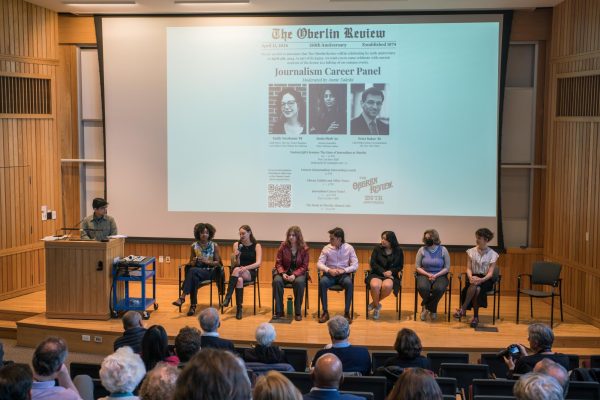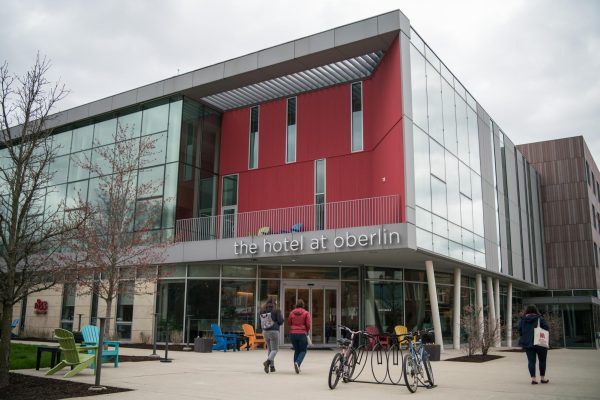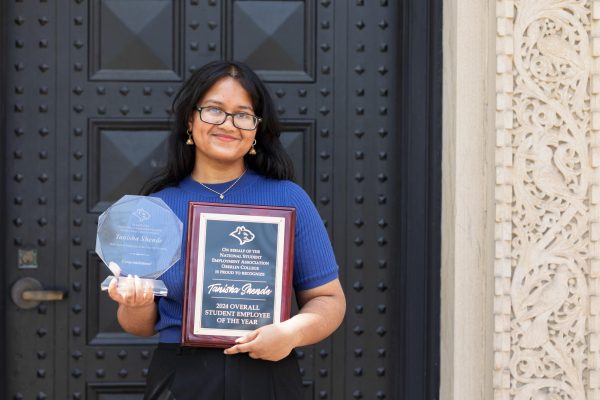Student Participation Reconsidered by College Faculty
Editor’s note: Editor-in-Chief Sydney Allen is a member of the Sophomore Experience Advising Task Force. She was uninvolved with the reporting of this story.
Oberlin College faculty will vote next Wednesday on whether to allow student representatives to attend their regular meetings as voting members. The vote will impact eight students who sit on five different committees. Students have technically been voting members of the committee for over 40 years, though they have rarely attended the meetings in recent years.
The issue was initially raised by Nathan A. Greenberg Professor of Classics and Presiding Officer of the College Faculty Kirk Ormand. However, according to Ormand, he hadn’t intended to bring the question forward.
“A faculty member asked me about membership at the meetings, and I told him I’d look into it,” Ormand wrote in an email to the Review. “When I did, I discovered — to my surprise — that in 1974 the faculty had passed legislation making various student members of College committees members of the [College Faculty].”
Those committees in question are the Educational Plans and Policies Committee, the Committee on Admissions and Financial Aid, the Advising Committee, the Experimental College Committee, and the Double-Degree Committee, according to the CF motion put forward on the topic. Student representatives on all those bodies are technically currently approved participants of CF meetings.
However, in recent years, these practices had been forgotten, and student representatives were not informed of their ability to attend CF meetings.
“No one seems to remember when the students stopped coming and stopped voting,” said Professor of Mathematics Jeff Witmer. “It was so long ago that no one really even remembered that there were supposed to be students at these meetings.”
This confusion was shared by student representatives.
“I’ve been on EPPC since my sophomore year and didn’t know that I could go to a [CF] meeting until last fall,” said College senior and EPPC student member Meg Parker. Parker said she has attended one CF meeting over her time on EPPC, but was never aware that she could attend more regularly.
After his discovery, Ormand approached Interim Dean of the College of Arts and Sciences David Kamitsuka.
“The Dean and College Faculty Council responded by bringing the CF a motion to ‘present for approval’ the members of the CF at the first meeting of every year, as a way to clarify the issue and make sure that we keep the membership lists current,” Ormand wrote. “So, within the framework of bringing the (techn´ ically existing) student members forward ‘for approval’ this year, the issue came to the floor.”
The vote on student representation nearly took place at the previous CF meeting on Oct. 3.
Ultimately, the group decided to hold off until student representatives could be made aware of their ability to attend meetings.
“I was very pleased to see that we did put the vote on hold until students were made aware of the fact that they can attend and vote at CF meetings,” said Associate Dean of Students and Interim Director of the Career Development Center Dana Hamdan.
Hamdan is among numerous voting members of the CF who are not part of faculty. The full list of voting members is outlined in the bylaws regarding divisional faculty membership, which also includes the guidelines on student participation.
Some faculty, including Associate Professor and Chair of Geology Zeb Page, were concerned about the haste with which the vote was originally going to take place.
“I don’t think the whole thing came about as a concerted effort on anyone’s part to disenfranchise students,” Page said. “However, I think we were on the verge of doing that. Not only am I opposed to that as a matter of policy, I am opposed to it because it was rash.”
According to Page, the decision to postpone the vote was made after a number of CF members advocated for slowing the process down and including students in the body’s deliberations.
Now, the CF are faced with a vote that has its membership somewhat divided.
Witmer, for one, believes that students should be able to attend CF meetings with a voice but not a vote.
“Having students present to discuss things that affect students directly is important,” Witmer said. “When it comes to actually voting, I think the faculty should be voting on faculty matters.”
Witmer cited his time as Acting Dean of the College of Arts and Sciences, saying that he would attend Student Senate meetings and contribute, but wasn’t given a vote on matters pertaining directly to students.
Page sees things differently.
“I don’t think it makes sense for all students to have a vote,” he said. “However, there are some students who, by virtue of their positions on different committees, I think they have a reason to vote.”
Parker, who plans to attend the upcoming CF meeting, agrees, saying that the ability of students to work on committees like EPPC could potentially be compromised by the outcome of this vote.
“I’m there in discussions and in meetings with EPPC,” Parker said. “I do all the same work that the faculty members are doing. And it would mean a lot to my power on that committee if I also lost the same voting privileges.”
Still, Witmer and others aren’t sold.
“Whether or not [students] should vote I’m guessing will be voted down, but maybe that’s just how I think I’m going to vote at this point,” Witmer said. “And it’s dangerous to think everyone else is going to agree with me.”
The CF will make its decision in its upcoming meeting Wednesday, Nov. 7.




